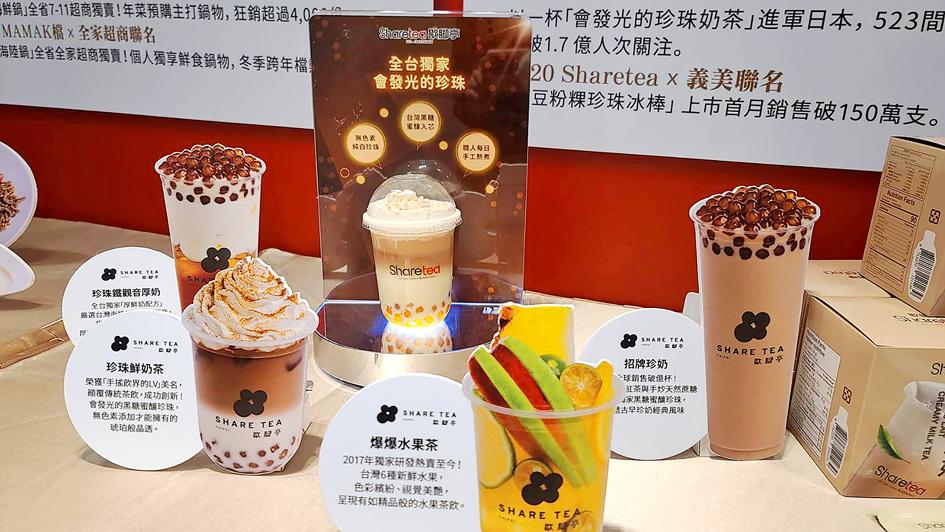Lian Fa International Dining Business Corp (聯發國際餐飲), which owns bubble tea brand Sharetea (歇腳亭), is to launch an initial public offering (IPO) on the Taipei Exchange (TPEX) on Friday, moving up from the Emerging Stock Board.
The company started trading its shares on the Emerging Stock Board on Jan. 7 last year, and closed at NT$145 on Friday.
Sharetea started as a black tea stall on Taipei’s Nanyang Street in 1992 and established Lian Fa in 2004. It now has more than 350 outlets in 13 markets worldwide, including Canada, the Czech Republic, Hong Kong, Indonesia, the Philippines, Singapore, the United Arab Emirates (UAE), the US and Vietnam.

Photo: CNA
Its IPO prospectus showed that it operates 125 Sharetea outlets in the US, its largest market, and 44 shops in Hong Kong, the second-largest.
The company runs 22 stores in Taiwan.
Lian Fa is upbeat about the global bubble tea market, as it expects a compound annual growth rate of 9 percent over the next five years, with sales expected to reach US$4.3 billion in 2027 from US$2.32 billion in 2020.
In the first nine months of last year, Lian Fa posted NT$614 million in consolidated sales, up 31 percent from a year earlier.
Net profit hit NT$85.57 million (US$3.1 million), or earnings per share of NT$5.52, compared with a profit of NT$19.3 million, or earnings per share of NT$1.47, for the entire 2020, it said.
Lian Fa president Lai Po-yu (賴伯宇) said in the statement that Sharetea’s global expansion plan focuses on the US.
The firm expects the number of US stores across 24 states to rise to 131 by the end of the first quarter, Lai said, adding that the firm is preparing to open more than 40 new Sharetea outlets in the country, including stores in one state where it is not yet present.
Prices per cup at Sharetea stores are from US$5 to US$7, higher than coffee at Starbucks, but many US consumers favor the Taiwanese brand, Lian Fa said, adding that while about 50 percent of its US outlets are run by ethnic Chinese franchises holders, only 30 percent of its US customers are ethnic Chinese.
The company is also seeking to expand in the Middle East, with a planned outlet in Kuwait, after it opened its first of four outlets in Dubai, UAE, in 2012.
Lian Fa has signed an agreement with a partner in Kuwait, where its outlet would be the only international hand-shaken beverage brand store, it said.

In Italy’s storied gold-making hubs, jewelers are reworking their designs to trim gold content as they race to blunt the effect of record prices and appeal to shoppers watching their budgets. Gold prices hit a record high on Thursday, surging near US$5,600 an ounce, more than double a year ago as geopolitical concerns and jitters over trade pushed investors toward the safe-haven asset. The rally is putting undue pressure on small artisans as they face mounting demands from customers, including international brands, to produce cheaper items, from signature pieces to wedding rings, according to interviews with four independent jewelers in Italy’s main

Macronix International Co (旺宏), the world’s biggest NOR flash memory supplier, yesterday said it would spend NT$22 billion (US$699.1 million) on capacity expansion this year to increase its production of mid-to-low-density memory chips as the world’s major memorychip suppliers are phasing out the market. The company said its planned capital expenditures are about 11 times higher than the NT$1.8 billion it spent on new facilities and equipment last year. A majority of this year’s outlay would be allocated to step up capacity of multi-level cell (MLC) NAND flash memory chips, which are used in embedded multimedia cards (eMMC), a managed

In the wake of strong global demand for AI applications, Taiwan’s export-oriented economy accelerated with the composite index of economic indicators flashing the first “red” light in December for one year, indicating the economy is in booming mode, the National Development Council (NDC) said yesterday. Moreover, the index of leading indicators, which gauges the potential state of the economy over the next six months, also moved higher in December amid growing optimism over the outlook, the NDC said. In December, the index of economic indicators rose one point from a month earlier to 38, at the lower end of the “red” light.

The global server market is expected to grow 12.8 percent annually this year, with artificial intelligence (AI) servers projected to account for 16.5 percent, driven by continued investment in AI infrastructure by major cloud service providers (CSPs), market researcher TrendForce Corp (集邦科技) said yesterday. Global AI server shipments this year are expected to increase 28 percent year-on-year to more than 2.7 million units, driven by sustained demand from CSPs and government sovereign cloud projects, TrendForce analyst Frank Kung (龔明德) told the Taipei Times. Demand for GPU-based AI servers, including Nvidia Corp’s GB and Vera Rubin rack systems, is expected to remain high,